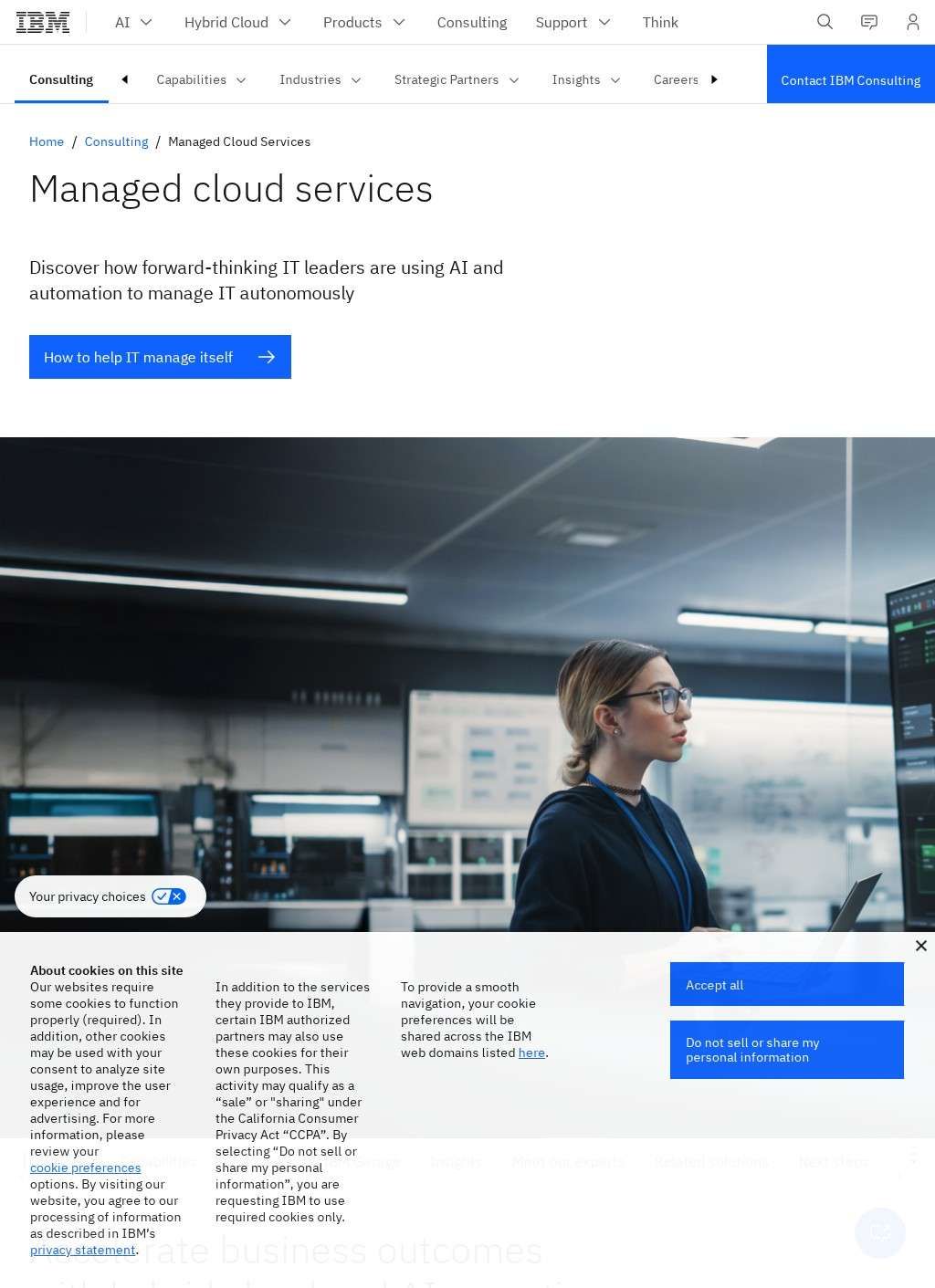IBM Managed Cloud Services operates as a comprehensive enterprise platform designed to handle the complexities of modern hybrid and multi-cloud environments. The service represents IBM's commitment to delivering high-quality IT solutions that align with business objectives while accelerating cloud transformation journeys. Organizations partnering with IBM gain access to a team of certified professionals who specialize in managing complex cloud architectures across AWS, Microsoft Azure, Google Cloud, and IBM Cloud platforms. This multi-vendor approach ensures companies aren't locked into a single cloud provider while maintaining consistent operational standards across their entire technology stack.
The platform's AI-enabled approach sets it apart from traditional managed service offerings. IBM leverages generative AI and machine learning technologies to create autonomous IT management systems that can predict issues before they occur, automatically resolve common problems, and continuously optimize performance without human intervention. These intelligent systems analyze patterns across vast amounts of operational data, identifying trends that might indicate potential failures or security vulnerabilities. The result is dramatically reduced downtime and improved system reliability that enables organizations to focus on strategic initiatives rather than firefighting operational issues.
Application lifecycle management forms a central pillar of IBM's service delivery model. The platform supports organizations through every stage of their application journey, from initial development and migration to ongoing maintenance and eventual modernization. IBM's methodology, powered by Red Hat technologies, ensures applications migrate seamlessly to cloud environments while maintaining security, cost-effectiveness, and operational agility. The service includes comprehensive application modernization strategies that help organizations transform legacy systems into cloud-native architectures capable of scaling with business demands.
Security and compliance remain paramount throughout IBM's managed services approach. The platform implements enterprise-grade security monitoring, threat detection, and incident response capabilities that operate around the clock. IBM's security specialists continuously monitor client environments for potential threats, applying automated remediation where appropriate and escalating complex issues to human experts when necessary. This layered security approach helps organizations meet stringent compliance requirements while protecting sensitive business data and maintaining customer trust.
Cost optimization represents another significant advantage of IBM's managed services model. The platform includes integrated FinOps capabilities that continuously analyze cloud resource usage, identifying opportunities for cost reduction without compromising performance. These systems automatically right-size resources based on actual usage patterns, recommend reserved instance purchases for predictable workloads, and eliminate unnecessary services that accumulate over time. Organizations typically achieve 10-15% annual cost savings through these optimization efforts, with many clients seeing even greater reductions as their cloud maturity increases.
The hybrid-by-design approach enables organizations to maintain optimal placement of workloads across on-premises and cloud environments. IBM's specialists help clients determine which applications benefit most from cloud migration versus those that should remain on-premises due to performance, security, or regulatory requirements. This strategic guidance ensures technology investments align with business outcomes while avoiding costly mistakes that can derail digital transformation initiatives. The platform provides unified management capabilities across all environments, giving organizations complete visibility and control regardless of where their workloads reside.
DevOps integration accelerates software development and deployment cycles through IBM's proven frameworks that combine design thinking, agile methodologies, and DevOps practices. Development teams gain access to automated build and deployment pipelines, comprehensive testing environments, and monitoring tools that provide real-time insights into application performance. This integrated approach reduces time-to-market for new features while maintaining high quality standards that protect brand reputation and customer satisfaction.
The service's reporting and governance capabilities provide executive-level visibility into IT operations and business outcomes. IBM delivers regular reports that translate technical metrics into business language, helping leadership understand the value delivered by their technology investments. These insights enable data-driven decision making around future technology strategies and budget allocations. The platform also enforces governance policies that ensure consistent security, compliance, and operational standards across all managed environments.
Partnership opportunities extend IBM's reach through a network of certified system integrators and specialized service providers. These partnerships enable IBM to deliver locally relevant services while maintaining global consistency and quality standards. Partners receive extensive training and certification programs that ensure they can deliver IBM's managed services methodology effectively. This ecosystem approach benefits clients by providing access to specialized expertise while maintaining accountability through IBM's oversight and quality assurance processes.
Continuous improvement mechanisms ensure IBM's managed services evolve with changing technology landscapes and client needs. The platform incorporates feedback loops that capture lessons learned from client engagements, feeding these insights back into service delivery methodologies and automation capabilities. This approach helps IBM stay ahead of emerging trends while delivering proven solutions that minimize risk for client organizations. Regular service reviews ensure ongoing alignment between delivered services and evolving business requirements.
Getting started with IBM Managed Cloud Services involves a comprehensive assessment of current IT environments, business objectives, and technical requirements. IBM's specialists work closely with client teams to develop customized service agreements that address specific needs while providing clear success metrics and accountability frameworks. The onboarding process includes detailed migration planning, risk assessment, and timeline development that ensures smooth transitions with minimal business disruption.
